________________
VII. THE JAINA AND THE NON-JALNA INDIAN ETHICAL DOCTRINES 229
mind and the intelligence, and by curtaining knowledge through these it deludes the embodied soul. The senses and the attachment and aversion to the objects of the senses are the enemies of the soul.2 The mental dwelling upon the objects of the senses brings about attachment to them which in turn engenders desires producing anger on their being obstructed. The consequential effect of anger is infatuation giving rise to the loss of memory by which intelligence declines and as a consequeuce, ruin follows. Thus the mind which is fickle, passionate, strong and obstinate, and which is not easily controllable like wind, should be curbed by incessant practice and non-attachment;s the senses are required to be kept under control and the desires need be extirpated. Mere withdrawing of the senses from the external performance without subduing the desires will be mere hypocrisy. According to Jainism also, the control of the mind, along with the senses and the desires is necessary for higher progress. He who restrains the monkey of mind wandering through the objects of the senses gets the desired fruit. In case one fails, the scriptural study, the performance of austerity, and the observance of vows and bodily penance-all these become useless. Thus the camels, in the form of the five senses, should not be let loose; after grazing the whole pasture of pleasures they again hunt the soul into the ground of rebirth.10 Hence by capturing the leader, viz., the mind, all others (senses) are captured; the roots being pulled out, the leaves necessarily wither. 11 Desire acts like wine in exciting the senses. 12 Again, the desire for the objects of the senses produces passions like anger etc.13. These passions which appear in the form of attachment and aversion delude the mind and snatch away its stability.14 The bird of mind fails to fly when the feathers of attachment and aversion are cut.15 The seed of attachment and aversion is delusion, which eclipses knowledge, with the consequence that the real nature of things remains hidden.16
POSITIVE SIDE OF CONDUCT-CULTIVATION OF VIRTUES: We now turn to the consideration of the positive side of conduct. According to
1 B.G. III. 4a. 2 Ibid. III. 34. 3 Ibid. II. 62. • 4 Ibid. II. 63. 5 Ibid. VI. 34, 35. Ibid. III. 41. 7 Ibid. III. 6. 8 Jñanā. XXII. 23. 9 Ibid. XXII. 28. 10 Pp. II. 136. 11 Ibid. II. 140. (Translation vide-UPADHYE Intro. p. 19). 12 Jñānā. XVII. 7. 13 Ibid. XX. 2. 14 Ibid XXIII. 7. 15 Ibid. XXIII. 27. 16 Jñānā. XXIII. 30; Istopa. 7.
Jain Education International
For Personal & Private Use Only
www.jainelibrary.org




